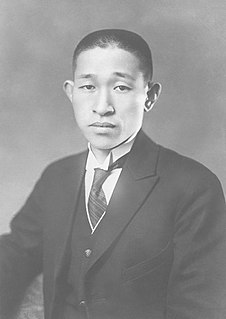A Quote by Dalai Lama
Material progress and a higher standard of living bring us greater comfort and health, but do not lead to a transformation of the mind, which is the only thing capable of providing lasting peace. Profound happiness, unlike fleeting pleasures, is spiritual in nature. It depends on the happiness of others and it is based on love and affection.
Quote Topics
Affection
Based
Bring
Capable
Comfort
Depends
Fleeting
Found Happiness
Greater
Happiness
Health
Higher
Higher Standard
Lasting
Lasting Peace
Lead
Living
Love
Love And Affection
Material
Mind
Nature
Only
Others
Peace
Pleasures
Profound
Progress
Providing
Spiritual
Standard
The Only Thing
Thing
Transformation
Unlike
Us
Which
Related Quotes
It is a basic human need that everyone wants to
live a happy life. For this, one has to experience
real happiness. The so-called happiness that one
experiences by having money, power, and
indulging in sensual pleasures is not real
happiness. It is very fragile, unstable and fleeting.
For real happiness, for lasting stable happiness,
one has to make a journey deep within oneself and
get rid of all the unhappiness stored in the deeper
levels of the mind. As long as there is misery at
the depth of the mind all attempts to feel happy
at the surface level of the mind prove futile.
I think we all mistake certain things for happiness. I think we mistake comfort for happiness and we mistake pleasure for happiness, and entertainment for happiness, when really these are just things we use as proxies for our happiness. We use them to cheer us up or try and achieve brief happiness, when really happiness is something much more profound and long lasting and exists within us.
There are two kinds of happiness - the temporary pleasure derived primarily from material comfort alone and another more enduring comfort that results from the thorough transformation and development of the mind. We can see in our own lives that the latter form of happiness is superior because when our mental state is calm and happy, we can easily put up with minor pains and physical discomforts. On the other hand, when our mind is restless and upset, the most comfortable physical facilities do not make us happy.
Too much of the world's happiness depends on taking from one to satisfy another. To increase my standard of living, someone in another part of the world must lower his. The worldwide crisis of hunger that we face today is a result of that method of pursuing happiness. Industrialized nations acquire appetites for more and more luxuries and higher and higher standards of living, and increasing numbers of people are made poor and hungry. It doesn't have to be that way.
I had always been taught that the pursuit of happiness was my natural (even national) birthright. It is the emotional trademark of my culture to seek happiness. Not just any kind of happiness, either, but profound happiness, even soaring happiness. And what could possibly bring a person more soaring happiness than romantic love.
Material objects give rise to physical happiness, while spiritual development gives rise to mental happiness. Since we experience both physical and mental happiness, we need both material and spiritual development. This is why, for our own good and that of society we need to balance material progress with inner development.
In our concern for others, we worry less about ourselves. When we worry less about ourselves an experience of our own suffering is less intense. What does this tell us? Firstly, because our every action has a universal dimension, a potential impact on others' happiness, ethics are necessary as a means to ensure that we do not harm others. Secondly, it tells us that genuine happiness consists in those spiritual qualities of love, compassion, patience, tolerance and forgiveness and so on. For it is these which provide both for our happiness and others' happiness.
Whatever worldly thing we may covet-zealously striving to obtain and then retain-never seems to bring an end to our desires. Covetousness, envy, jealousy, and greed always escalate into a vicious spiral, as we seek greater and greater gratification but find less and less contentment. . . . Striving to acquire the things of the world not only does not bring lasting happiness and peace, but it drives us to seek more. When "all we've ever wanted" is grounded in the temporal trappings of this world, it is never enough!



































